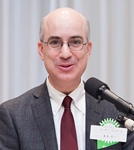A Year Full of Surprises Witnessed by a Foreign Correspondent
December 9, 2015
Mr. Peter Landers
Tokyo Bureau Chief
Wall Street Journal
 My mother has long been a Rotarian in Michigan, USA, enjoying various meetings to deepen her knowledge and engaging in service activities. My 102-year-old grandmother lives in Brooklyn. When my mother went to her place for cleaning, she happened to find the Rotary Bulletin dated 1974, reporting about the speech made by my grandfather who was a scholar on mathematical history at New York University. I feel grateful for this opportunity to make my speech at Rotary Club 40 years after him.
My mother has long been a Rotarian in Michigan, USA, enjoying various meetings to deepen her knowledge and engaging in service activities. My 102-year-old grandmother lives in Brooklyn. When my mother went to her place for cleaning, she happened to find the Rotary Bulletin dated 1974, reporting about the speech made by my grandfather who was a scholar on mathematical history at New York University. I feel grateful for this opportunity to make my speech at Rotary Club 40 years after him.
I am Tokyo Bureau Chief at Wall Street Journal (WSJ), an economic newspaper founded in 1889. We currently have about 1.91 million subscribers, including online readers. We launched our Japanese edition six years ago and distribute them online to our paid subscribers. High-quality journalism inevitably becomes costly and thus we strive to increase paid subscribers as the main target of our management strategy.
Journalists must also work hard to give exclusive news and insightful analysis. This year, Tokyo Bureau reported about the selling of stocks by Universal Studio Japan shareholder to Comcast in the USA, two weeks prior to the formal announcement. We also got a scoop last month on a German chip maker Infineon Technologies willing to invest in the Japanese semiconductor firm Renesas Electronics. Last week, a feature article about Japan appeared on the front page of the American edition, explaining how Japan leads the world in turning the challenge of an aging society into a chance for innovation and social inclusion. I was a little surprised to find a positive outlook on a challenging issue of aging society.
Now, let me look back on this year and share three surprises. In January, shocking images of two Japanese men held hostage and murdered by the Islamic State surprised us all with their cruelty. We have witnessed an outrageous spread of terrorism throughout the world, including the coordinated terror attacks in Paris. Major powers of the world must collaborate and suppress terrorist groups at their strongholds in Syria and Iraq. Chairman Rupert Murdock of News Corporation rightly pointed out in his speech last month that ��the US is expected to play a proactive role and exercise leadership.��
Japan is also expected to play a greater role. Prime Minister Abe proposed the security bills which were enacted this year. I was surprised to witness a surge of resistance, especially among numerous young people who staged demonstrations in front of the Diet building that proved the sound basis for democracy in this country. I have to say, however, the mass media and the general public are yet to engage in open and honest discussions on various aspects, including how to deal with the threat posed by China. There is a consensus in Japan that China��s ambitious maritime strategies must be stopped and to solidify Japan-US alliance. On the other hand, a majority supports the pacifist Constitution and opposes the risk of Japan��s Self-Defense Forces getting involved in combat situations overseas. How to ensure consistency between such contradictory thinking is a challenge yet to overcome in order to conclude the postwar era in a real sense.
WSJ Tokyo Bureau also focuses on business news in Japan, as our overseas readers are eager to be informed on the trends of leading companies like Sony, Toyota, Honda and Nintendo. This brings us to my third surprise concerning ��cars.�� Last week, we issued a forward-looking column entitled ��Could Self-Driving Cars Spell the End of Ownership?�� We have privately owned petroleum engine cars over 100 years until a big change took place this year in the auto industry. WSJ news coverage indicates high-technology companies based in Silicon Valley are entering the industry to change the whole picture of competition once fought solely among auto companies in the world, including Toyota, GM and European manufacturers. Today, companies like Apple Inc. and Google are recruiting hundreds of engineers and even executives from auto companies to develop electric cars and self-driving cars with massive resource allocation. I observe Japanese companies base their technological development on a traditional motorized society with human drivers while high-tech companies in Silicon Valley pursue ideal cars looking toward the future.
Uber is an American company that provides an innovative ride-hailing service. Instead of cab drivers bringing you to your destination, Uber drivers who use their own cars come to pick you up. The company aims to eventually use self-driving cars to cut on labor costs. This futuristic taxi service will pose a challenge to the industrial basis in Japan unless we try hard to keep up with the world competition.
The Upper House election awaits in Japan next July. Prime Minister Abe makes the economy top of the agenda while keeping a low key on constitutional amendment. The real GDP data for July-September released yesterday showed a slight upturn, but we must continue keeping a close eye on how far the GDP growth rate will become next year to build a robust economy advocated by the Abenomics economic policies.